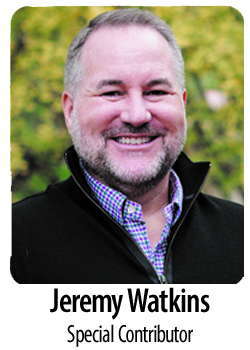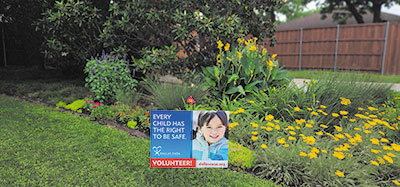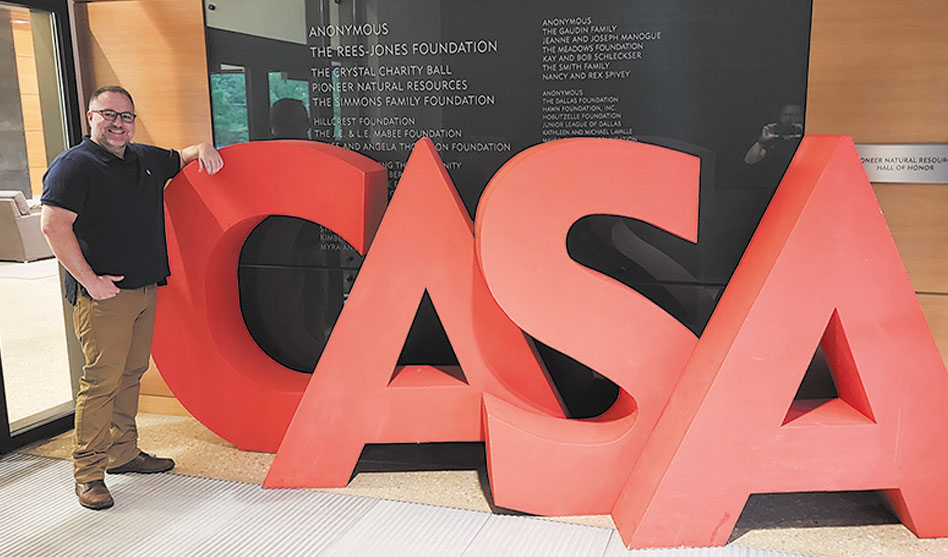Becoming a CASA Dallas volunteer provides opportunities to help kids when they need help the most
 If you are not yet familiar with Dallas CASA — Court Appointed Special Advocates — let me share with you a little bit about the important work that the organization does. In short, CASA works to ensure that every child in Dallas County who has been placed in the care of the state has an advocate to look out for their overall wellbeing. This includes confirming that they are in a safe environment and have access to educational and medical support.
If you are not yet familiar with Dallas CASA — Court Appointed Special Advocates — let me share with you a little bit about the important work that the organization does. In short, CASA works to ensure that every child in Dallas County who has been placed in the care of the state has an advocate to look out for their overall wellbeing. This includes confirming that they are in a safe environment and have access to educational and medical support.
Also, one key role of a volunteer advocate is to make recommendations to the court to help the judge decide the best permanent home for the child. A CASA volunteer can be thought of as a bit like a volunteer social worker.
I have always admired how CASA helps children directly and thought about volunteering with Dallas CASA for some time. My husband, Matt Hein, and I have adopted two girls, and my extended family includes a number of children who were adopted as well. So the idea of being able to have a direct impact and help a child is something very close to my heart.
So I applied to be a volunteer and completed a rigorous and comprehensive 30-hour training course. I was sworn in on May 4, 2023, and I accepted my first case a few weeks later. Then I began reviewing case documents to get up to speed.
Since that time, I’ve been able to build a really great relationship with my CASA kid. I have become another caring adult in their support system, working with foster parents, caseworkers, teachers, mentors, therapists and placement agency personnel.
It has been wonderful to help in such a direct way. Bringing these resources together, I have helped get the child clothes when needed, provided a Chromebook for school, coordinated resources so they could go on a much-anticipated school trip and supported their education and outside interests.
These are just a few of the many examples where I have had a direct impact.
 Also — and probably most importantly — I have helped coordinate regular visits between the child and their family. Having this connection with family can be essential to a child’s wellbeing, and I know that these visits would not be possible without my direct involvement as a Dallas CASA volunteer.
Also — and probably most importantly — I have helped coordinate regular visits between the child and their family. Having this connection with family can be essential to a child’s wellbeing, and I know that these visits would not be possible without my direct involvement as a Dallas CASA volunteer.
My background is in the technology industry, but I have used so many different skills in working to gather information and bring people together to help. The system can be frustrating, but it is really encouraging that there are so many people and nonprofit organizations working to help kids in protective care and their families.
Dallas CASA provides a volunteer for every child in Dallas County who needs one. Recruiting, training and supporting these volunteers is a monumental job. Because of the diverse children that Dallas CASA works with, it is important to have staff, volunteers and support from communities that reflect that diversity.
According to Shashaunda Williams, the DEI director with Dallas CASA, “Currently more than 30 percent of kids in foster care nationally identify as LGBTQ+. Having volunteers who support these kids is vital to a positive outcome.”
There is always a need for volunteers who are part of the LGBTQ community — not just to serve kids who may identify as LGBTQ but because having volunteers from diverse backgrounds and with differing experiences helps create a stronger group of volunteers to advocate for the best interests of every child.
Dallas CASA is particularly in need of bilingual Spanish-speaking volunteers, male volunteers, Black volunteers and LGBTQ volunteers.
If you want to make a difference and help a child today, consider volunteering with Dallas CASA. Visit DallasCasa.org for upcoming volunteer information sessions and more details on how you can help.
Also, this year I’m on the board of directors for the Gay and Lesbian Fund for Dallas (GLFD), and I am so excited for the opportunity to bring these two great organizations together to help raise money to send kids in foster care to summer camp.
To learn more about that project or donate to our efforts, check out GLFD.org.

